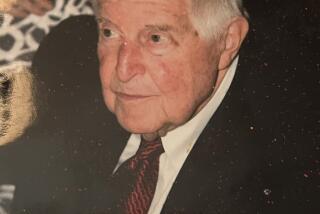PASSINGS: James McClure, Richard Lee Atkins, Juaneita Marie Veron, Frank Bare, Jack D. Forbes, Necmettin Erbakan
James McClure
Longtime U.S. senator from Idaho
Former U.S. Sen. James McClure, 86, a conservative Republican who spent 24 years in Congress representing Idaho and while chairman of the Energy Committee fought to keep Idaho’s wilderness areas controlled by the state, died Saturday at his home in Garden City, Idaho. The cause was complications from a series of strokes, his family said.
McClure was elected to the House of Representatives in 1966 and served six years before being elected to the Senate in 1972. During his career he earned a reputation as a nuts-and-bolts legislator who was genial but reserved.
U.S. Sen. Jim Risch (R-Idaho) called McClure a “principled conservative” who could work with anyone to find solutions to difficult issues.
McClure spent six years during the 1980s as chairman of the Senate’s Energy and Natural Resources Committee.
He was born Dec. 27, 1924, in Payette, Idaho. McClure served in the Navy during World War II and earned a law degree from the University of Idaho in 1950. His political career started in the Idaho Senate in 1961.
After retiring from the U.S. Senate in 1991, McClure formed a lobbying firm with former staffers.
Richard Lee Atkins
Pioneering black real estate developer
Richard Lee Atkins, 85, a pioneering African American real estate developer, died Feb. 17 of complications from congestive heart failure at the Wadsworth Veterans Hospital in Westwood, said his daughter, Kathleen Atkins Wilson.
Atkins built homes in the Los Angeles County neighborhoods of Ladera Heights, Baldwin Hills, Windsor Hills and View Park, as well as several other properties in Los Angeles, including a library on the L.A. campus of what was then called Pepperdine College, his daughter said. In 1990 he started the Atkins Institute of Land Development, where he taught classes in real estate development. “‘Build the new town in town’ was one of his phrases,” his daughter said.
Atkins was born Jan. 11, 1926, in Ann Arbor, Mich. He served in the Marines from 1944 to 1946 in the Pacific theater.
He attended Eastern Michigan University from 1949 to 1951 and came to Los Angeles in the early 1950s, opening a cabinet shop. Atkins then started buying and developing property, his daughter said. During the 1984 Summer Olympics in Los Angeles, he founded a community village on Crenshaw Boulevard to promote African American culture.
He twice ran unsuccessfully for the L.A. County Board of Supervisors.
Juaneita Marie Veron
Former L.A. judge
Juaneita Marie Veron, 85, a former Los Angeles Municipal Court judge, died Feb. 12 after a long illness, said Superior Court Judge Robert Armstrong, her longtime friend and former legal partner. She had been in hospice care at a home in Santa Monica, Armstrong said.
Veron was appointed to the Municipal Court in 1977 by Gov. Jerry Brown and served there until retiring in 1994.
Born Nov. 3, 1925, in Fresno, Veron earned a bachelor’s degree in 1947 and a law degree in 1950, both from USC. Veron and Armstrong, who had been USC law school classmates, formed a law firm in 1952.
Frank Bare
Gymnastics figure
Frank Bare, 80, a champion gymnast who became the first executive director of what is now USA Gymnastics, died of pneumonia Friday at the V.A. San Diego Medical Center in La Jolla, said his wife, Linda.
Bare won an NCAA gymnastics title competing for the University of Illinois and was a gymnastics coach and judge. He was asked to lead the newly formed U.S. Gymnastics Federation when it was founded in 1963 and was the federation’s executive director until 1980.
In addition to organizing the first U.S. Gymnastics Federation national championships, Bare started the American Cup, which has become one of the sport’s most prestigious international events.
Bare was born Sept. 13, 1930, in Kennett, Mo., and grew up in Arkansas. He won the NCAA title in the pommel horse in 1952 and also won two Big Ten Conference championships. He graduated from the University of Illinois with a bachelor’s degree in physical education in 1954 and a master’s in 1959.
Bare was inducted into the USA Gymnastics and International Gymnastics halls of fame.
Jack D. Forbes
American Indian activist and scholar
Jack D. Forbes, 77, a prominent American Indian activist, author and scholar at UC Davis who co-founded the first tribal college in California, died Feb. 23 at Sutter Davis Hospital, family spokeswoman Melissa Johnson said. No cause was given.
In 1971, Forbes joined other American Indian activists to start Deganawidah-Quetzalcoatl University at a former Army facility several miles west of UC Davis.
He served on the board and taught as a volunteer for more than 25 years. The college lost its accreditation and closed in 2005.
Forbes was born Jan. 7, 1934, in Long Beach of Powhatan-Renapé and Delaware-Lenápe heritage. He earned a bachelor’s degree in philosophy, a master’s in history and a doctorate in history and anthropology from USC. He joined UC Davis in 1969 as one of the founding professors of its Native American studies program and retired in 1994.
Necmettin Erbakan
Leader of Turkish Islamic political movement
Necmettin Erbakan, 84, a longtime leader of Turkey’s Islamic political movement and briefly the country’s prime minister in the first Islamic-led coalition in its modern history, died Sunday of heart failure at a hospital in Ankara, Turkey, doctors said.
Erbakan served only a year as prime minister before he was pressured by the secular military to step down in 1997. His Welfare Party was shut down by the Constitutional Court for undermining secularism, which led to the birth of the country’s now ruling Justice and Development Party as well as several small pro-Islamic parties.
Erbakan was born in 1926 in Sinop on the Black Sea and taught engineering at Istanbul Technical University before entering politics. He was elected to parliament as an independent in 1969 and planted the seeds of the country’s political Islamic movement.
Erbakan, who was deputy prime minister in several coalitions in the 1970s, resigned as prime minister in June 1997 to appease the military, which has staged three coups since 1960.
Later he was barred from politics for five years and convicted of falsifying party records and hiding millions in cash reserves that were ordered seized after his party’s closure in 1998. He was elected head of the Felicity Party as soon as his political ban ended in 2003.
-- Los Angeles Times staff and wire reports
More to Read
Start your day right
Sign up for Essential California for the L.A. Times biggest news, features and recommendations in your inbox six days a week.
You may occasionally receive promotional content from the Los Angeles Times.






